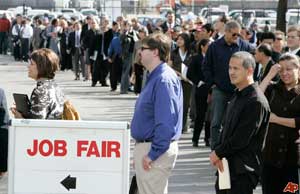 ANYTOWN, USA – The precipitous increase in the ranks of the unemployed throughout the country over the last year has revealed a patchwork of state and federal jobless programs for workers and families that provides little in the way of a level playing field.
ANYTOWN, USA – The precipitous increase in the ranks of the unemployed throughout the country over the last year has revealed a patchwork of state and federal jobless programs for workers and families that provides little in the way of a level playing field.
Despite the passage of extended unemployment benefits, help with COBRA payments and other assistance provided in the federal stimulus bill passed earlier this year, an article in the Wall Street Journal reveals an uneven situation in which some benefits are provided for some workers, but not for others.
One such program not available to all workers is a somewhat obscure federal program called Trade Adjustment Assistance. Launched in the 1960s, TAA offers superior unemployment benefits to U.S. manufacturing and farm workers who lose jobs due to imports or production shifts out of the country. Even though it was beffed up by President Obama in the stimulus bill, not all workers qualify for it, according to the WSJ.
“A tiny slice of America’s jobless currently receives the benefits — some 50,000 people, out of more than 5 million now collecting unemployment checks. But an examination of the TAA program and recent awards suggest that the pool of potential beneficiaries could be far larger.”
The WSJ goes on to say that the trade-adjustment program underscores a fundamental problem with the way U.S. unemployment benefits are distributed. “Critics say it’s impossible to pinpoint who, exactly, is displaced by global trade. Moreover, they say, singling out a small class of unemployed Americans for richer benefits is discriminatory.”
Other assistance has hit unintended snags, such as the COBRA plan included in the federal stimulus bill intended to help cover 65 percent of COBRA health insurance premiums for up to 9 months. Designed with the normal scenario in mind in which a worker loses their job and the has a certain amount of time to sign up for COBRA coverage, the plan has hit a serious roadblock in the case of workers who receive group health insurance through unions such as the Screen Actors Guild (SAG).
SAG members accumulate points throughout the year based on the amount of money they earn from either regular or piecemeal acting jobs. At a certain level, they become eligible for SAG health insurance coverage for the following year. If, during that year, an actor fails to earn enough credits, the coverage ends and the actor is then eligible to apply for COBRA.
Unfortunately, immediately after the passage of the president’s stimulus bill, neither SAG nor the federal government were clear about exactly who would qualify for federal COBRA help, leaving untold numbers of actors unsure of their status and faced with paying full premiums for COBRA coverage that they could not afford.
According to sources, the government and SAG have been negotiating over the past month to hash out the details of federal help for SAG members who are COBRA eligible, and a clarification of the progam has apparently been worked out.











No Comment